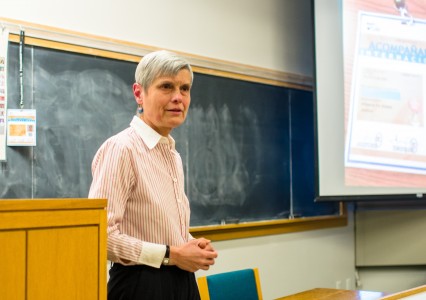
On Wednesday, Feb. 26, Ruth Meyer gave a talk entitled “Why Do We Train the Honduran Military and Police to Torture and Murder Their People?” Meyer is a Licensed Clinical Social Worker and has worked to teach children and adults, as well as provide recreational therapy to institutionalized youth, in Nicaragua, Chile and Honduras. In her talk, Meyer recounted several stories from her time in Honduras that illustrated the brutal repression and intimidation that the Honduran government subjects their people to. The S&B’s Carl Sessions ’15 spoke with Meyer on Thursday morning about her talk and the connections between the United States and this regime.
Last month, the Honduran Congress created a constitutionally-backed permanent military police force ostensibly to fight the “war on drugs,” but most Hondurans allege that its purpose is to “repress the population and popular dissent,” according to a report written by the Honduran Equality Delegation. What does this say about the Honduran government?
You have military and you have police, and now the government has created the military police on top of these two things … There’s no question that there is an increasing militarization of the country. It has never worked in other countries, when you have that level of impunity, where they can do what they want—and even torture and kill people—to increase the number that do that. Now you have a specialized force that will have even more expertise. And anyone in the know says that this is a horrendous thing to do, it’s just going to get worse.
Violence and terrorism directed towards LGBT individuals is a pervasive issue in Honduras. Where do these discriminatory ideologies come from?
There is a similarity between here and there. If you go back just 40 years in the United States, anybody who was LGBT was considered mentally ill, needing to be put in a state hospital or needing drugs to correct them. You have the macho culture, males are supposed to be macho and now you’ve got these “sissy gays”—it’s the same stereotypical ideas that exist here. The great thing is that with this social movement [in Honduras] that was created so organically, people meeting LGBT people and seeing that they’re not mentally ill, they’re like me, they want good education, they want clean water and clean food in their community and they want what I want. The greatest thing is that they came out as they did and fundamentally asked for the same agenda. It’s going at a faster pace than ours did … the common folk are being won over.
The report mentioned that the 2009 coup d’état helped to create a coalition between the LGBT and more mainstream leftist movements—in the last five years has this coalition grown?
The coup was in 2009, and then people took to the streets. As that’s fermenting and people are starting to talk to each other, already there was a type of social movement forming. What the LGBT community said to us was this: we were a community, then the coup happened and then we became a sexual diversity movement … They began to coexist and by 2011, when the Libre party was formed, they were now a part of the party. In between 2009 and 2011 this occurred.
There’s been criticism of Non-Governmental Organizations (NGOs) in Honduras—that they can be overly bureaucratic and they do not focus on political change. What other impacts does the NGO culture have on the people’s movement?
The fact is that the Non-Governmental Organizations tried to take a neutral stand and not really speak out on the political issues. So they’re not really effective. They’re not willing to put their neck out. What happens though is that funding will channel down and come to these NGOs and what it ends up doing is it sucks the possible funding from places that focus on political issues—just because they’re “proper.” They’ve got proper titles and they’ve got the bureaucratic presentation. And so the real grassroots are the ones that don’t look so slick with brochures. So, I think it’s more of the indirect way, you’re not going to get as much support or funding of that which would be more viable to create significant change because the NGOs can take up some of the resources. I can’t prove that, but it seems that way logically.



















































